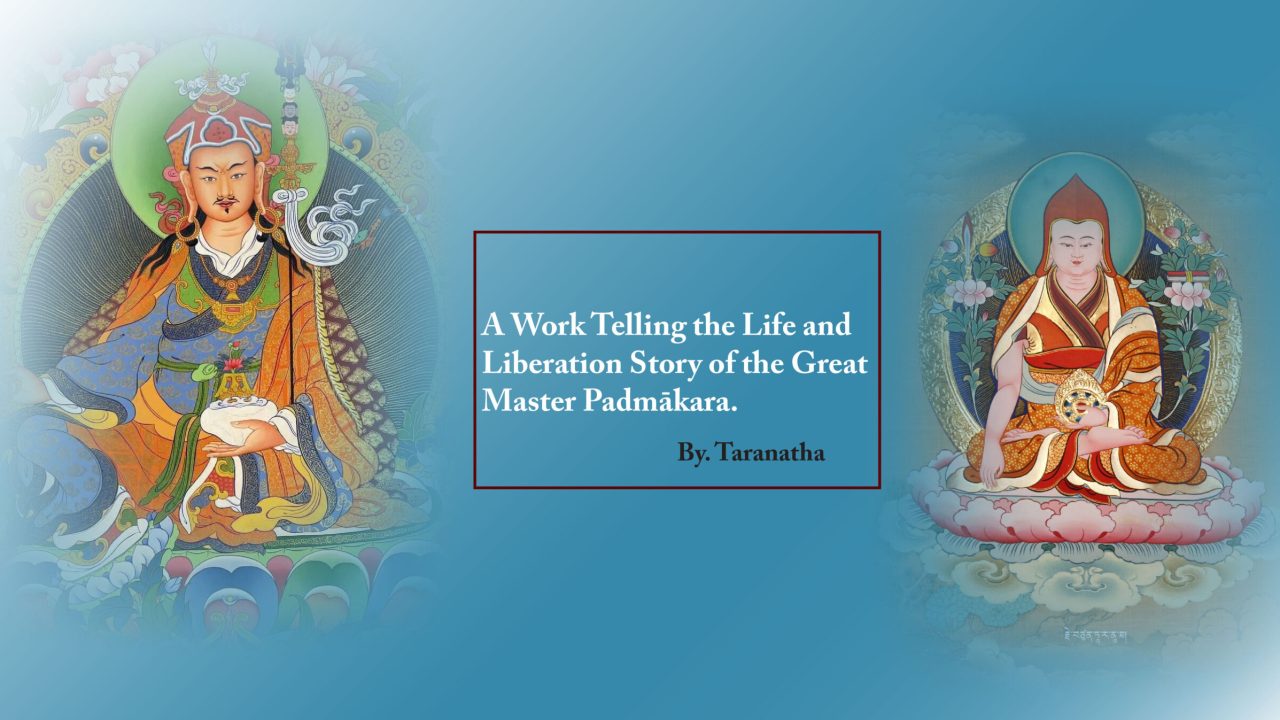Part 12
One time, the Master said, “For the benefit of the kingdom and the Tibetan people, I will perform a great fire offering ritual.” The king replied that he would wash his hair for the great festival that lay ahead. Ācārya Bodhisattva told the king, “On the north side of Mount Meru, there is a spring called Taktu Nang. If water is drawn from there to wash the king’s hair, he will have a long life, his lineage will spread, and this great kingdom will definitely remain.” When asked, “Who is able to carry its water?” the Ācārya replied, “Only the Tantric master has the power.” When this request was put to the Master, he stuffed some white silk into the mouth of a golden vase and placed it in the centre of a maṇḍala. Reciting mantras, the Master threw the vase into the air and it rose higher and higher until it finally disappeared. In only the time it takes to eat a meal, the vase reappeared all of a sudden in front of the Master, just as it was before. “Wash the king’s hair in that,” Master Padma said, and he handed it to the ministers. But inside the vase was a white, cloudy liquid and when it was taken to the grand assembly of ministers, they said, “This must surely be the intoxicating liquor of Mön that brings madness. Throw it away!” And so it was thrown out—lost and completely wasted.
Then the Master gave the king and his fortunate subjects the empowerments into the kriyā tantra and the Inner Tantras of Secret Mantra. He gave the king and many of his fortunate subjects the pith instruction A Garland of Views. He taught the texts Vajravidāraṇā and The Hundred Thousand Verses of the Kīla, pith instructions and practice texts—whatever was appropriate. He prophesied, “If I stay here for a long while, I shall make the whole region of Tibet peaceful and happy.” However, due to causes—the shared karma of sentient beings—and conditions—the dark forces of malevolent gods and demons that resided in the hearts of the ministers—this did not happen.
In The King’s Narrative, very little is written following the Master’s pronouncement that he would turn Tibet into a fine land. The omission of what followed was likely intended to prevent the history of the transmission of the Inner Tantras becoming public knowledge. For example, empowerments were referred to by the secret expression, “guiding through the stages.” In early times, outside of their own circle, secret mantra practitioners would keep the meaning and names of even the common empowerments hidden. The term “stages” appears in many of the old documents.
In the early histories of the pith instructions of A Garland of Views and Otren Palgyi Shönu’s Guide for the Sessions of Vajrakīla Group Practice and various other reliable histories, the following consistent accounts are given. While the Master was guiding the king through the stages, the supreme queens—including Queen Tsepong Zamé Togdrön and Queen Droza Tri Gyalmo Tsün, later known by her refuge name Jomo Changchub Jé asked if they might act as offering consorts in the maṇḍala. The Master replied, “They are not the only fortunate ones,” and prophesied that Lhamo Tsen of Chim and Lady Tsogyal of Kharchen were also fortunate ones who would be consorts. When asked, “These ladies live far away, how can they possibly attend?” the Master replied, “It is easy as this!” The instant he focused his meditative concentration the two women arrived at the edge of the maṇḍala. Not only that, these two also generated the spontaneously accomplished enlightened mind. Later, they completely abandoned all worldly activities and entered into practice. It is stated in all three testimonies of The King’s Narrative that because the two queens entered into practice from a young age, they left behind no temples in their names—an assertion borne out by this story.
